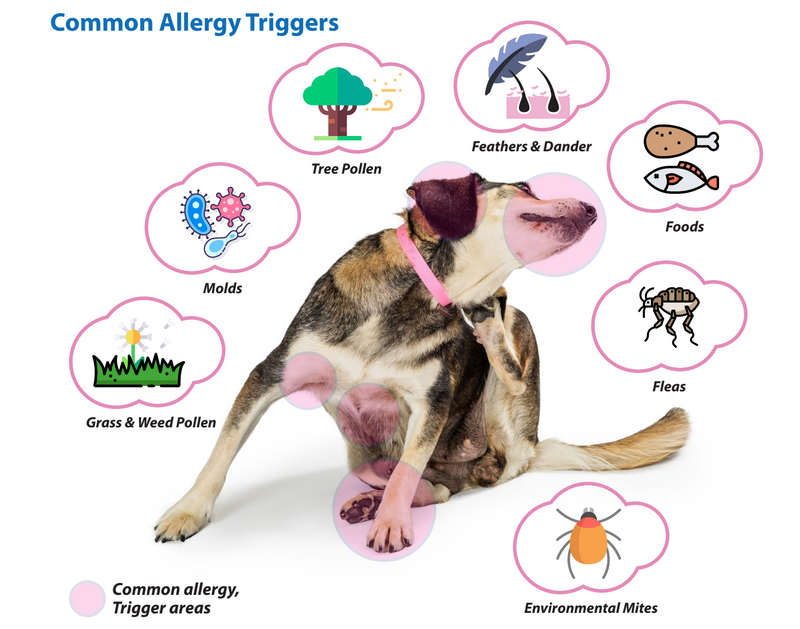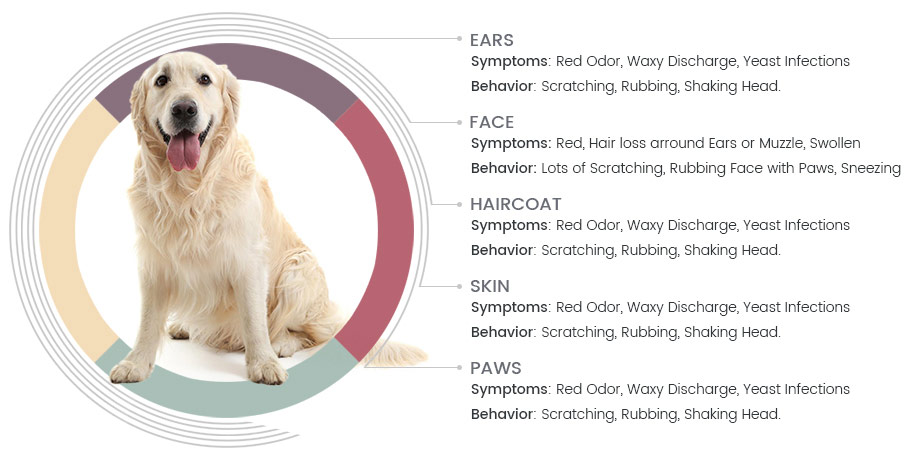Allergies in Dogs- What Every Pet Parent Should Know
Have you ever wondered if dogs can have allergies? Did your veterinarian tell you to avoid certain areas and food items just because your dog might be allergic to them? If so, then you might have a lot of questions in your head regarding the same. Don’t worry, we are here to enlighten you, so you can make wise, informed decisions.

Let’s start with understanding what allergies are and their causes.
What is an allergy?
It is the overreaction of the immune system to a particular external substance, called an allergen. Meaning if your dog’s immune system thinks that pollen is something that is not supposed to be entering the body, it causes a reaction against it. This leads to an allergic reaction; usually, these reactions are unnecessary.
What causes allergies in dogs?

When your dog is exposed to allergens, it triggers an immune response in their body that leads to the release of histamine. The unnecessary release of too much histamine can cause your dog a lot of discomfort including inflammation, itching, and swelling. There can be various reasons that can cause an allergic reaction in your dog; most allergens are proteins from plants, insects, animals, or foods.
Symptoms of Allergy in your dogs
There are many different signs and symptoms of allergic reactions; depending on the severity of the reaction it can show on your dog. Some common ones to know are:

- Redness
- Itching , Itchy rash
- Sneezing / wheezing / Coughing
- Red, itchy eyes
- Runny, itchy, stuffy nose
- Difficulty in breathing
- Hives
- Swelling, Inflammation
- Diarrhea , Vomiting
These symptoms can vary with the type of allergic reaction. Some can have less severe reactions and they can resolve within a few hours or days, but some can be more hazardous or even life-threatening. If you notice your dog wheezing or having difficulty in breathing, visit your vet immediately.
Types of Dog Allergies
Different types of allergies pose a challenge for your pooch that you as a pet parent should be aware of. Some of the common ones are:
1 – Skin allergies: It is also called allergic dermatitis; this is one of the most common allergies that occur in canines. There are three main causes of this- Fleas, food, and environmental allergens. You can notice red, itchy, and flakey skin, and along with that, you can also see some sores and hair loss. Skin allergies pose a threat to secondary reactions as they can spread easily through scratching, biting, or licking the area. As your dog bites or scratches, it opens the skin and sends an open invitation to bacteria and fungi to infect them.
2 – Food allergies: These can be developed during the life of a dog or can be inherited by their parents. They can develop an aversion to certain food items, usually; it is the proteins in the foods that cause such reactions. It can be managed by making changes in their diet and by avoiding the foods that cause such allergic reactions. Dogs with food allergies can have varied reactions including vomiting and diarrhea.
3 – Flea Allergy Dermatitis: It is the leading cause of allergic reaction in dogs; caused because of a flea bite. It is caused by antigens that enter your canine’s body from the saliva of a flea as it feeds on a host. It can also be caused due any other insect bite.
4 – Atopic dermatitis: It is a type of skin disease that is caused especially because of airborne environmental allergens like pollen, house dust, cleaning products, or even carpet fibers. It depends on the allergens that your dog might be allergic to; they will show a reaction to it. The most common sign is skin irritation and redness or can be localized as well. The allergies can also be seasonal, so it may be worse in particular weather than at any other time of the year.
Testing for Dog allergies

The first thing your veterinarian will ask about is the specifications of when these reactions occur. So, if you have noticed a pattern, it might help in the diagnosis. If they have an idea about a likely cause they might conduct an allergy test and try to determine the allergen that is causing the reaction. Skin and blood testing are some methods that vets will use to determine the type of allergy. Flea allergy dermatitis is usually the easiest to perform as it is usually diagnosed by looking for fleas that might be stuck to your pet’s skin under the fur.
Treatment of Dog allergies
The best way to treat an allergy is to avoid the allergens. However, this might not be possible in every case, so your vet will suggest a treatment course depending on the type of allergy. For example, the best way to avoid flea allergy dermatitis is to kill the fleas whereas the best way to treat food allergies is to avoid the dog food that your canine is allergic to.
In addition to any treatment, lifestyle changes may be required and your vet will also provide a soothing agent and suggest relief measures that will keep your pooch feeling better.
Bottom Line
If your pooch has an allergy form grass, playing in the park can cause him discomfort. Every substance that can cause their body to react can be harmful and avoidance is the best course of action for sensitive dogs. You can talk with your vet and desensitize your canine against pollens and other common allergens so that they can live a bit more happy and carefree.

